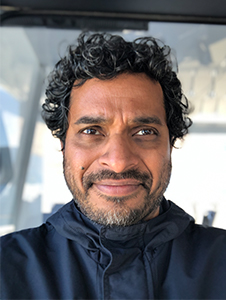Wednesday 10 March 2021 2:07pm

A conference organised by the the National Centre for Peace and Conflict Studies will focus on social media.
From hate speech to terrorism, regulation to misinformation, social media’s impact on democracy will take centre stage at a University of Otago conference this month.
New Ec(h)o Systems: Democracy in the Age of Social Media, organised by the National Centre for Peace and Conflict Studies, will feature some of the world’s leading voices involved in social media regulation, disinformation, hate speech, journalism, countering violent extremism and related domains.

Lead-organiser Sanjana Hattotuwa
Lead-organiser Sanjana Hattotuwa, whose PhD studied social media content after the Christchurch massacre in March 2019, says the two-day event will cover three major themes: the double-edge of democracy and social media; the social psychology of users and digital communities; and the political anthropology of on-line indigenes and activists – giving voice to the marginalised versus deleting those at the margins.
“This is the first conference to take a holistic, whole-of-society and whole-of-government approach to information disorders affecting democracy, after the release of the Royal Commission Report on the Christchurch massacre.
“In the midst of a tsunami of regional and global discussions around social media regulation, it aims to unpack a lot of what we read about and question assumptions. It will highlight global conversations around social media and democracy and help share New Zealand experiences, and the moral leadership of the Christchurch Call, with the world,” he says.
“Sessions cover a wide range of perspectives, including youth, Māori and Pacific peoples. Each is anchored to speak to a domestic, regional or global issue that lies at the heart of complex yet pressing conversations around how to grapple with social media’s impact on democracy. The good and the bad.”
Speakers include David Shanks, New Zealand’s Chief Censor, Paul Ash, of Christchurch Call and the Prime Minister's Special Representative on Cyber and Digital, Nicole Matejic, of the Department of Internal Affairs, Maria Ressa, a Time Person of the Year and renowned Philippine journalist, Zeynep Tufekci from University of North Carolina at Chapel Hill, Susan Benesch, Director of Dangerous Speech Project, and Meenakshi Ganguly, South Asia Director of Human Rights Watch.
“Everyone who is part of the conference has a voice that participants would greatly benefit hearing from, and indeed, in New Zealand, would extremely rarely get to hear in person,” Hattotuwa says.
“Sessions cover a wide range of perspectives, including youth, Māori and Pacific peoples. Each is anchored to speak to a domestic, regional or global issue that lies at the heart of complex yet pressing conversations around how to grapple with social media’s impact on democracy. The good and the bad.”
The conference is timely, not only for being held two years after the Christchurch massacre, but one year since New Zealand’s first COVID-19 lockdown.
“The pandemic is an invitation to revise political, policy and profit models no longer fit for purpose. Coronavirus has accelerated the pace of social media’s weaponisation. At the same time, opportunities arising from new norms around remote working and virtual connections provide fertile landscapes to seed and strengthen prosocial content and conversations.
“In framing a daily contest between democratic potential and divisive propaganda, this conference will strengthen the critical appreciation of contemporary challenges around social media,” Hattotuwa says.
New Ec(h)o Systems: Democracy in the Age of Social Media
When: 16 and 17 March, 2021
Venue: The Terrace Lounge, Union Building, 640 Cumberland Street, University of Otago
Address: 315 Leith Street, Dunedin 9016
Registration: http://bit.ly/newechoregistration
Agenda: http://bit.ly/newechoagenda
Conference overview: http://bit.ly/newechooverview
Session details: http://bit.ly/newechosessions
Facebook: http://facebook.com/ncpacsotago
Twitter updates: http://twitter.com/ncpacs